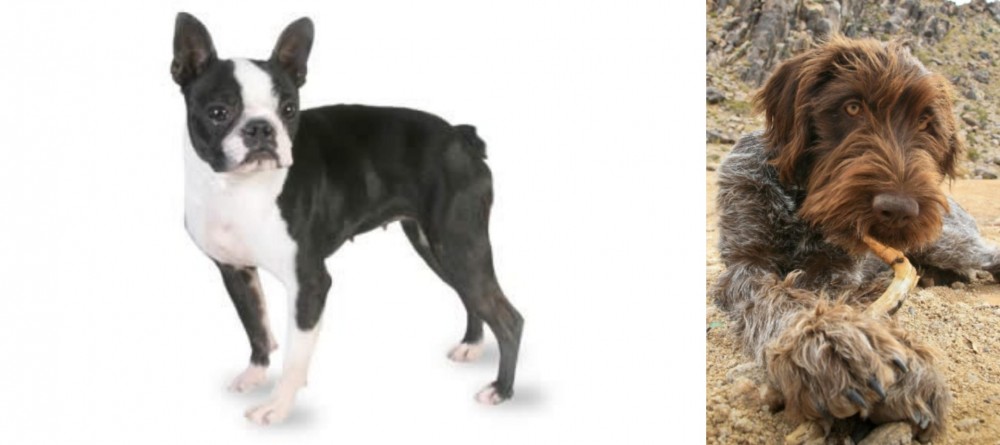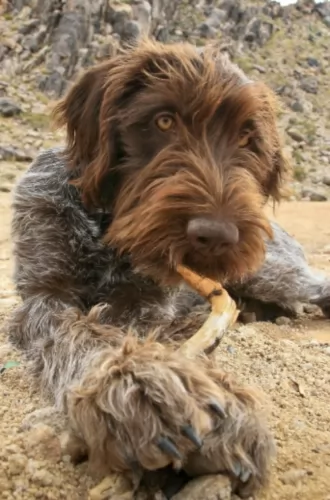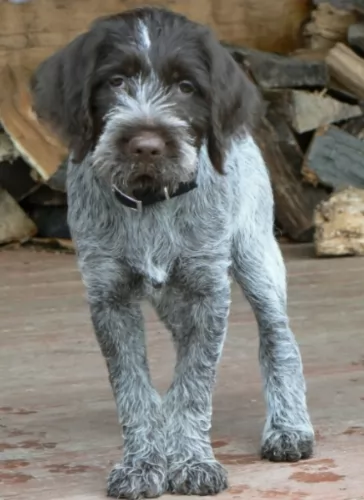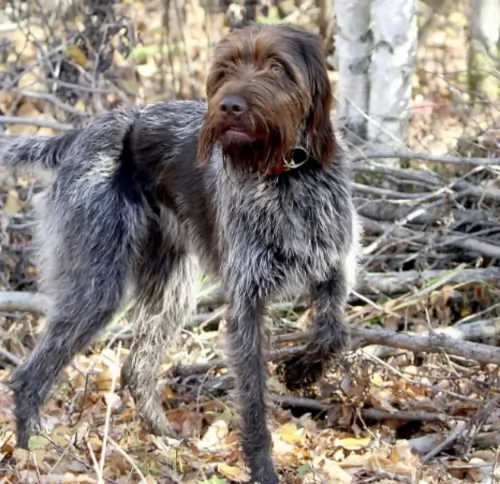 Petzlover
Petzlover Boston Terrier is originated from United States but Wirehaired Pointing Griffon is originated from France. Boston Terrier may grow 17 cm / 6 inches shorter than Wirehaired Pointing Griffon. Boston Terrier may weigh 16 kg / 35 pounds lesser than Wirehaired Pointing Griffon. Both Boston Terrier and Wirehaired Pointing Griffon has almost same life span. Boston Terrier may have less litter size than Wirehaired Pointing Griffon. Boston Terrier requires Low Maintenance. But Wirehaired Pointing Griffon requires Moderate Maintenance
Boston Terrier is originated from United States but Wirehaired Pointing Griffon is originated from France. Boston Terrier may grow 17 cm / 6 inches shorter than Wirehaired Pointing Griffon. Boston Terrier may weigh 16 kg / 35 pounds lesser than Wirehaired Pointing Griffon. Both Boston Terrier and Wirehaired Pointing Griffon has almost same life span. Boston Terrier may have less litter size than Wirehaired Pointing Griffon. Boston Terrier requires Low Maintenance. But Wirehaired Pointing Griffon requires Moderate Maintenance
 Nicknamed the American Gentleman, the Boston Terrier is the result of crossing the British Bulldog with the white English Terrier. At first the Boston Terrier was bred to be a fighting dog, but since then, undesirable characteristics have been bred out and today the Boston Terrier is regarded as an indoor dog that doesn’t tolerate extreme weather conditions.
Nicknamed the American Gentleman, the Boston Terrier is the result of crossing the British Bulldog with the white English Terrier. At first the Boston Terrier was bred to be a fighting dog, but since then, undesirable characteristics have been bred out and today the Boston Terrier is regarded as an indoor dog that doesn’t tolerate extreme weather conditions.
The breed emerged in the 1870s when Robert Hooper from Boston bought a dog thought to be a mix of a Terrier and Bull type lineage. A specialist breed club was formed in 1891 and in 1979 the commonwealth of Massachusetts named the Boston Terrier the Official State Dog. By the 20th century, the breed’s color and patterns were standard and an essential feature.
 Known also as the Korthals Griffon, the Wirehaired Pointing Griffon is a hunting- and gundog. It was Eduard Karel Korthals who is thought to have brought about this dog breed around 1873.
Known also as the Korthals Griffon, the Wirehaired Pointing Griffon is a hunting- and gundog. It was Eduard Karel Korthals who is thought to have brought about this dog breed around 1873.
He was a Dutchman living in France. It is believed that quite a few dog breeds were used to bring about this dog such as the Otterhound, Spniels, Setters and possibly a Pointer. The dog is known as a supreme gundog and it is a very popular dog breed.
Edward Korthals of Holland was looking for an ideal gun dog. It was in 1888 that the first Griffon Club was formed. It was only in 1916 that this dog was officially recognized as the Wirehaired Pointing Griffon in the United States.
 The Boston Terrier is a lively, strong-willed breed with an alert expression and fairly large, erect ears. He is a small to medium sized dog and his square muzzle puts him among the Bull breeds.
The dog is compact in build and varies quite significantly in size. Weight with the dog is actually divided into 3 categories – lightweight (under 6.8kg), middleweight (up to 9kg) and the heavyweights being between 9.1kg and up to 11.4kg. The Boston has a short head and a naturally short, low-set tail. The coat is short and smooth, and the colour can be brindle with white markings, brown and white or black and white.
The Boston Terrier is a lively, strong-willed breed with an alert expression and fairly large, erect ears. He is a small to medium sized dog and his square muzzle puts him among the Bull breeds.
The dog is compact in build and varies quite significantly in size. Weight with the dog is actually divided into 3 categories – lightweight (under 6.8kg), middleweight (up to 9kg) and the heavyweights being between 9.1kg and up to 11.4kg. The Boston has a short head and a naturally short, low-set tail. The coat is short and smooth, and the colour can be brindle with white markings, brown and white or black and white.
It’s the energetic liveliness of the Boston Terrier that makes him such a lovable and popular pet. He has an affectionate, gentle nature that makes him a fantastic family pet and he gets on well with children and pets in the home. He can adapt to city or country life. One or two interesting facts of this breed are -
with his short nose, he is prone to drool and snore
he is prone to corneal ulcers because of his large, somewhat protruding eyes
with a small pelvis, the females often battle with the birthing process and may require a caesarean section.
 The Wirehaired Pointing Griffon or Korthals Griffon is a medium-to-large sized dog standing at between 50 and 60cm both male and female and weighing between 23and 27kg.
The Wirehaired Pointing Griffon or Korthals Griffon is a medium-to-large sized dog standing at between 50 and 60cm both male and female and weighing between 23and 27kg.
He has a wiry, somewhat harsh curly outer coat and a softer undercoat. The head is quite large. He has thick eyebrows and a beard. The eyes are brown with yellow irises.
This is a low-shedding dog. There are a few colors such as white and brown, white and orange but the coat is also steel gray with brown markings.
These dogs are intelligent and independent with a desire to please their owners. He is able to learn tricks and commands easily. They love their human families and want to be around them all the time.
It would be devastating for such a dog to find himself stuck in the backyard with no human contact. He is also not suited to cramped living conditions in the city but is essentially a country dog, especially since he has boundless energy.
As a family pet, he is playful, friendly, loyal, loving and gentle, behaving well with children and other pets. They’re not aggressive dogs but they make excellent watchdogs, barking if someone comes into their property.
 The Boston Terrier is such a sweet little dog, but you can’t really say what your puppy’s personality will be as personality varies quite a bit between individual Boston’s. Remember that just like with a human child, your puppy will turn out with characteristics that can be attributed to the way he was raised. The Boston just loves his human family and he wants to be part of all your activities, even though he may gravitate towards one favorite family member.
The Boston Terrier is such a sweet little dog, but you can’t really say what your puppy’s personality will be as personality varies quite a bit between individual Boston’s. Remember that just like with a human child, your puppy will turn out with characteristics that can be attributed to the way he was raised. The Boston just loves his human family and he wants to be part of all your activities, even though he may gravitate towards one favorite family member.
Your Boston is a Terrier and that means he is full of life and will require being exercised by you. He can’t just be left outdoors day after day because this is one particular breed that can’t adapt to changing weather conditions. He likes being inside where the temperature is more even. Look after your Boston, because if you do, you’ll be rewarded by having one of the best friends you’ve ever had.
 The Wirehaired Pointing Griffon has always been a great hunting dog and he doubles as an excellent pet and companion as well.
The Wirehaired Pointing Griffon has always been a great hunting dog and he doubles as an excellent pet and companion as well.
This dog is extremely loyal to his human family and is friendly, intelligent, loving and affectionate, getting on well with children as well as other pets in the home.
He can reach 14 years of age and doesn’t often get sick, making him an all-round great pet and companion.
 Boston Terriers are generally healthy, feisty little dogs but it is always wise to know that you may well come across some health conditions that can affect your pet.
Boston Terriers are generally healthy, feisty little dogs but it is always wise to know that you may well come across some health conditions that can affect your pet.
Your Boston may well have to contend with cataracts, and in the dog world, this isn’t only an ailment for old dogs. Juvenile cataracts can develop in young puppies already. Cherry Eye is another eye problem with a prolapse of the gland of the third eyelid. It is also an eye disease than can be found in young dog of less than a year old.
Boston Terriers actually have a fairly high incidence of deafness in one or both ears. White Bostons tend to produce more puppies with deafness.
The Boston Terrier is a brachycephalic dog and therefore more predisposed to Brachyphalic Syndrome where the dog battles to breathe because of too much soft tissue which forms in the airways.
To avoid many dog diseases with your Boston, buy your puppy from a reputable dog breeder who screens dogs used in a breeding program as this prevents puppies inheriting genetic disorders.
 The Boston Terrier is a lively dog, and even though he doesn't have any extreme exercise requirements, he will still require you exercising him by taking him on walks, or having ball games with him. As an essentially indoor dog, he can even enjoy some quieter indoor games.
The Boston Terrier is a lively dog, and even though he doesn't have any extreme exercise requirements, he will still require you exercising him by taking him on walks, or having ball games with him. As an essentially indoor dog, he can even enjoy some quieter indoor games.
You’ll be able to gauge how much your pet requires in terms of high quality food, but by the time he is an adult, he usually has one or two bowls of food a day. Size and age play an important role in determining his eating habits. Home made foods made up of rice, meat and vegetables are always welcome for your pet and these can be added into his top quality commercially produced dog food. For a healthy dog who is free of skin problems include some raw meat in the diet from time to time. Always make sure that there is a bowl of fresh, cool water which is available 24/7.
With his short coat, the Boston Terrier isn’t a heavy shedder and is low maintenance in terms of keeping his coat groomed. Brush him at least twice a week to remove loose hairs and to also prevent flea and tick infestations. Brush his teeth 2 or 3 times a week to ensure no plaque build-up which can damage the teeth. Never use human toothpaste, but invest in special toothpaste and -brush for dogs. If he is essentially an indoor dog, you may have to get the vet to trim his nails too.
 This dog loves his exercise, and if you live in the country so much the better. He will love to go hiking and swimming with you or running next to you as you go cycling. He also loves all kinds of rope- and ball games in the garden. It’s why this active dog isn’t ideal for life in the city.
This dog loves his exercise, and if you live in the country so much the better. He will love to go hiking and swimming with you or running next to you as you go cycling. He also loves all kinds of rope- and ball games in the garden. It’s why this active dog isn’t ideal for life in the city.
Spay or neuter your pet if you don’t want unwanted puppies. Don't do it too early. Speak to your vet about the procedure and about the health benefits that come from spaying and neutering a dog.
These are active dogs and they will require top quality food if they’re to remain healthy and active.
Always check the packaging to see what ingredients are present in your dog’s food. Some of the cheaper, more inferior brands can actually be harmful to your pet with their useless ingredients devoid of vitamins and minerals.
Some home-made food is good and this needs to be plain and free from spicy additives. Dogs have sensitive stomachs and anything unusual can cause them digestive problems.